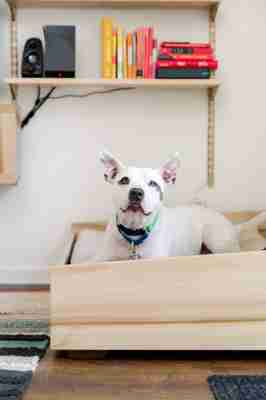
While taking good care of your dog doesn’t have to mean being harmful to the environment, it can be especially challenging to be eco-friendly when it comes to taking care of dogs.
When you have a dog or puppy, you’re going to need to stock up on plenty of supplies, many of which are commonly made of environmentally unfriendly materials like plastic — but that isn’t the only option! Eco-friendly pet products are gaining popularity and are one small way you and your dog can try to make the world a little bit better. Here are six ways to make your dog’s life a bit greener, without sacrificing comfort or happiness.

Treats and Food
There are plenty of ways to make your pets’ food and treat choices even greener. Many high-quality foods include information about environmental impact and sustainability on their packaging or on their website, but there are a few things to keep in mind as a conscious consumer.
Vegetables:
If your dog likes produce, you’re in luck! Many veggies like raw carrots, broccoli, celery, green beans, snow peas, and sugar snap peas can be used in training sessions and as treats. (You can also purchase a variety of dog treats made from dehydrated sweet potato.) Curious about what is safe to feed your dog from the fridge? Check the American Kennel Club’s list of vegetables that are and aren’t safe for dogs, and The ASPCA poison control is always a great resource for checking whether certain foods are dog-safe. If you aren’t sure if a food is safe to share with your dog, it’s also a good idea to check with your veterinarian.
Cricket:
Yep, we’re talking about the bugs — it’s a sustainable meat option and gaining in popularity. Jiminy’s treats focus specifically on insect protein for dogs. Why make the switch to a grub or two? They’re far more eco-friendly than traditional, beef-based dog treats; the beef industry relies on tons of water and emits millions of pounds of greenhouse gasses each year.
Fish:
Some single-protein fish treats are sustainably sourced and can be a great option if your dog has allergies to other treats. (Always consult with your dog’s vet before trying new treats if you have any concerns.) It’s always a good idea to do your own research about each company’s sustainable practices and if their type of fish farming aligns with your values.
And a note about packaging:
Regardless of what food and treats you select, consider what kind of packaging your dog’s food comes in. If you have the space and funds, it can save both money and shipping costs to buy the economy-sized bag of dog food. It might also be worth seeking out packaging that is recyclable so that you eliminate unnecessary consumer waste.
Dog Beds
Even if your dog sleeps with you, investing in a bed means they will have a spot they can call their own. Many traditional dog beds are made with foam or fleece, but there are plenty of eco-friendly options to match any decor, including ones made from hemp and recycled materials , as well as recycled plastic bottles . Project Blu makes classic-looking dog beds out of recycled clothing and ocean-bound plastic, while Avocado uses reclaimed wood to make handcrafted wooden beds complete with a biodegradable and coconut husk mattress available in small and large dog sizes.
Poop Bags
According to LiveScience , dogs in the United States produce an estimated 10.6 million tons of poop every year! Yikes! That’s a lot of waste, especially when you consider that a lot of people pick their dog’s waste up in plastic bags and then dispose of it in the trash, thus making its way to landfills.
Scooping poop is important not only so your neighbors don’t hate you , but also to protect the environment, given that dog poop is a pollutant and can harm waterways and carry disease if not picked up and disposed of properly. Instead of using plastic bags, you can purchase compostable poop bags made from plant-based products — many of them come in boxes or rolls for easy on-the-go scooping.
It’s worth checking the fine print before telling yourself that you bought the right kind of bag. In 2015, the FTC warned consumers that 20 different manufacturers labeled certain dog poop bags as being “biodegradable” or “compostable,” but might actually have deceived consumers in the process. Many of these products need certain amounts of sunlight or airflow to break down, and will indicate they are not necessarily biodegradable under typical landfill conditions.
If you have a yard, there are companies like Green Pet Composting in the Pacific Northwest that will pick up poop from your yard and take it to their facility that is set up to safely compost and process dog poop and compostable poop bags, as well as compostable cat litter, and turn it into safe compost.
Transportation
Using public transportation is a great way to travel with your pet to and from the vet or training classes. In many cities, you can transport small pets including small dogs on city busses and subways, but they do typically need to be in a carrier for the duration of their trip. Check with your local transportation department for more specific rules, or if you have any questions.
But what if you have a larger dog that doesn’t exactly fit inside a small carrier? Bunch Bike’s K9 cargo bike is specifically designed for transporting large dogs and comes in an ebike option. I recently had the opportunity to test drive the bike, and while my giant dog wasn’t a fan, it’s a great option if you’d like to avoid using a car.
Toys
Dogs love toys, but unfortunately, there are no national safety regulations on pet toys manufactured sold in the United States, which means that toys can be made of any materials which could be harmful or toxic. Most commonly, dog toys are made of plastic or with plastic components, and when dogs are done playing with them, those shredded faves often wind up in a landfill.
Thankfully, as more consumers are interested in sustainable pet products, companies have even more incentive to make fun, eco-friendly options made from recycled rubber and other materials. The earth toy from Planet Dog is a great option, and West Paw’s Zogoflex has an innovative new approach to recycling dog toys. When their dog toys are too chewed for your dog to safely play with, you can send them back to West Paw and the toys will be sanitized, recycled (ground up), and remodeled into new toys for other dogs to enjoy. If your pets prefer plush toys, there are eco-friendly options made with organic wool and hemp fabrics.
Collars and Leashes
Most dog collars, leashes, and harnesses are made of leather or nylon webbing, which is sturdy but is a type of plastic. Eco-conscious dog guardians looking for something can find attractive gear for pets that is good for the environment. Take Cycle Dog , for instance: The company upcycles old rubber from bike tires and transforms it into dog collars that are waterproof and durable. You can also find leashes made out of hemp , or collars, leashes, and harnesses made from recycled water bottles . These options are not only better for the environment but also come in fun and stylish designs and colors.
